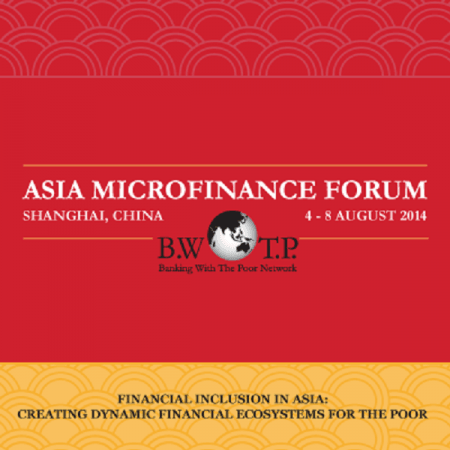
Numerous people in Asia do not have access to appropriate financial products and services, but new business models, technology and delivery channels developed by commercial banks, microfinance institutions, NGOs and other financial services providers may be closing the financial exclusion gap and contributing to inclusive growth and poverty alleviation.
This and many other pertinent topics will be discussed at the forthcoming Asia Microfinance Forum 2014 (AMF), to be held in Shanghai, China from 5-7 August, 2014.
Themed "Financial inclusion in Asia: Creating dynamic financial ecosystems for the poor", the Forum will discuss financial frameworks, policies and regulations; financial capability; demand‐driven products; behavioral economics; digital finance; microfinance as a catalyst for SME growth; achieving impact among target groups and more.
Two world leaders in microfinance will open the Asia Microfinance Forum 2014 as keynote speakers: Sir Fazle Hasan Abed, KCMG, Founder and Chairperson of BRAC; and Robert Annibale, Global Director of Citi Microfinance and Community Development.
"The event provides a platform to explore opportunities and solutions to challenges by drawing on a diversity of approaches and fresh thinking from across the Asia region" says Banking with the Poor Network Chairman, Mr Chandula Abeywickrema.
"We see financial inclusion is creating dynamic financial ecosystems for the poor in Asia, and delegates can look forward to learning from the best in the field through a series of workshops, plenary sessions and networking functions beginning on the 5th of August."
This is the fourth regional forum since 2006 convened by the Banking with the Poor Network and organized by the Foundation for Development Cooperation, in partnership with the Citi Foundation as Lead Sponsor and The China Association of Microfinance as Local Host.
Over 400 delegates representing microfinance institutions, government agencies, credit unions, community‐based institutions, commercial banks, mobile network operators, central banks and regulators, development banks, insurance companies, educational and research institutions, donor groups, NGOs, financial hardware and software providers, consultants and professional service firms are expected to attend the AMF.
The Forum will bring together leading industry experts, heads of commercial banks and development financial institutions, regulatory body heads of several Asian countries as well as scholars and practitioners of diverse fields of microfinance and financial inclusion to deliberate and present pragmatic solutions for discussion at the Forum.
AMF delegates will further have the opportunity to participate in a variety of sessions to learn about new initiatives, discuss and debate 'best practice', exchange knowledge and build partnerships to increase progress towards achieving greater financial inclusion in the region.















